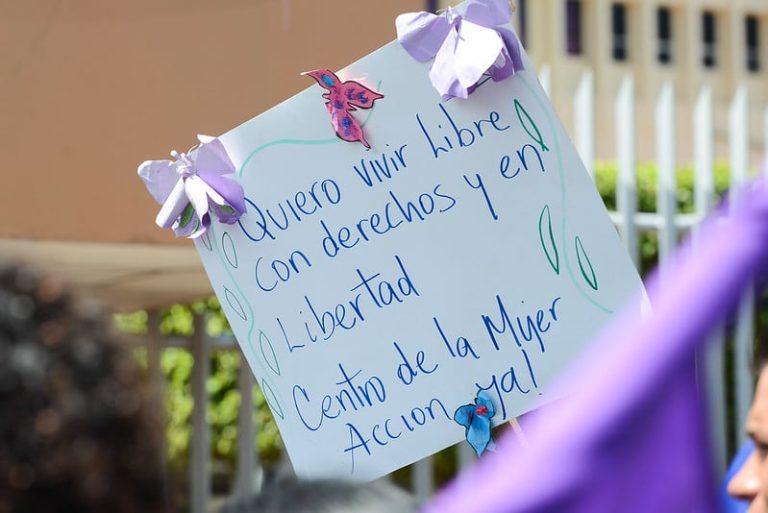10 de marzo 2021

Children of Exile: The Births “Sowing Hope” in the Camp of Nicaraguan Farmers

PUBLICIDAD 1M
PUBLICIDAD 4D
PUBLICIDAD 5D
We need democracy to reclaim women’s rights. And women’s participation is a must to have a democracy.

On International Women’s Day, Nicaraguan women mourned the 11 women lost to femicides since 2021 began. In 2020, the final toll was 71 women dead. Another 115 women survived attempted femicides.
These are the highest numbers in the last three years, for the worst form of macho violence in our country. The data comes from the organization “Catholics for the Right to Decide”. They’re the only statistics available, since the Nicaraguan government doesn’t offer any detailed or periodic data.
To the murders, we must add many other crimes against women. These include rape, sexual abuse, domestic violence, abuse of power, and a lack of basic rights. These in turn occur in an atmosphere of constant sexist expressions against women. Women experience these things daily, all over the world, in a system that oppresses them for the fact of being women.
In our country, though, the women and the general population must deal with an additional form of oppression. The one exercised by an authoritarian regime that stifles dissent for all citizens.
The multiple forms of repression carried out by the Nicaraguan State have included sexual violence as a method of torture. The practice has been amply documented by local and international human rights organizations. Yet, despite the multiple forms of oppression, the population’s demand for freedom and democracy persists.
Academics have studied the correlation between democracy and gender equality, with varying results. Beyond the different nuances, though, strong conclusions can be drawn. One of them is that the two elements are related, and they mutually reinforce each other.
For that reason, democracy had been a demand sustained by women’s movements throughout the decades. Without the basic elements of it, gender equality isn’t possible, nor the reclaiming of our rights.
In Nicaragua, moving beyond the authoritarian state to a democracy is an urgent matter for women. We need a democracy that respects human rights and basic freedoms, in order to be able to protest freely in public.
We want democracy to continue demanding social justice and to construct a society committed to a positive peace. That can only happen under a government that respects the rule of law, with strong, independent institutions and transparency.
We demand authorities who document violence against women. A government that doesn’t cover up or hide the data to protect their image as “a good government”. We also need a trustworthy judicial system, one that ends impunity for perpetrators of femicides and abuse against women.
We want democracy so we can build solid institutions that protect the most vulnerable populations. Institutions without patronage or populism, that respond to our demands and carry out effective and corrective policies.
Women demand participation in democratic spaces as autonomous political individuals. To be allowed their own discourse and decisions, and not be tokens so a government can boasts of its gender parity.
Having a democracy would allow us to continue fighting to exercise power on an equal footing with men. It would allow us to continue demanding more forcefully the rights we’ve historically been denied for being women.
Today, more than ever, we Nicaraguan women want to exercise our right to vote. That right was achieved by valiant activists who confronted the system to have us recognized as citizens. We want to exercise that right in autonomy and without fear. We want our votes to count.
Women have long struggled for equality and freedom, and for the construction of a fairer system for all. That, in essence, is democracy.
It’s clear that the passage from dictatorship to democracy is barely beginning. As researcher Caroline Beer affirms: “It’s not realistic to expect that democracy will solve longstanding structural problems like income, racial, ethnic and gender inequality in just a few years, after a new regime is established.”
We women know that after the end of this regime, a long road lies before us to reach gender equality. But we must begin well, aspiring to a complete democracy that takes women and their visions into account.
Those who today clamor for democracy should first internalize their demands and question their discourses and practices. They should follow the example of the Nicaraguan women who have struggled all through our history. These women have given us lessons in consistency, ethics, determination and courage.
Democracy doesn’t only mean civil rights, participation in elections, or the creation of institutions. It requires the active participation of all citizens in order to function.
Women need democracy to reclaim their rights, and women’s participation is needed to have a true democracy.
Nicaragua deserves such a holistic democracy. We deserve a democracy that incorporates the visions of all. We want a country where we all belong and respect each other.
Archivado como:
PUBLICIDAD 3M
Periodista nicaragüense desde 2007, con experiencia en prensa escrita, televisión y medios digitales. Tiene una especialización en producción audiovisual y una maestría en Medios de Comunicación, Estudios de Paz y Conflicto de la Universidad para la Paz de las Naciones Unidas. Fundadora y editora de Nicas Migrantes, proyecto por el cual ganó el Impact Award 2022 del Departamento de Estado de EE. UU. Ha realizado coberturas in situ en Los Ángeles (Estados Unidos), México, El Salvador, Guatemala, Nicaragua y Costa Rica. También ha colaborado con France 24, The Guardian, Al Jazeera, BBC World Service. Ha sido finalista y ganadora de varios premios nacionales e internacionales, entre ellos el Premio Latinoamericano de Periodismo de Investigación Javier Valdez, del Instituto Prensa y Sociedad (IPYS), 2022.
PUBLICIDAD 3D